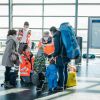Two weeks full of gratitude
Many thousands of Germans are taking in war refugees from Ukraine; we visited one of them.
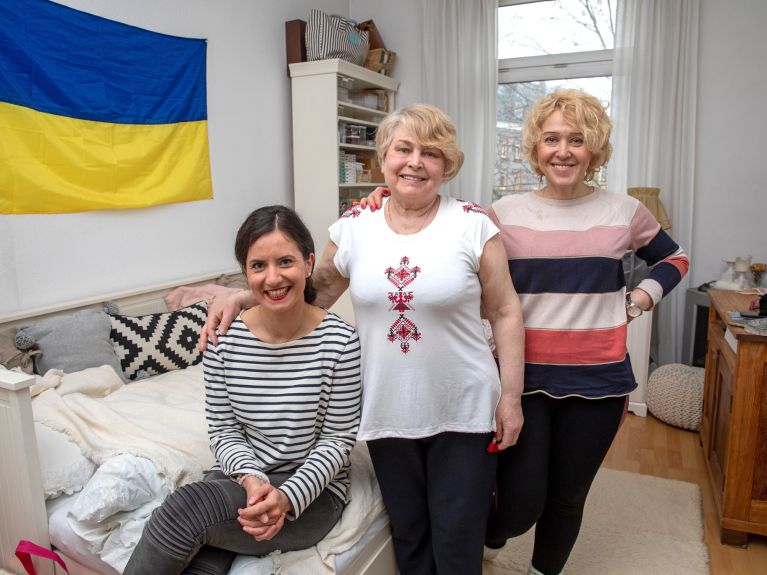
When the flight attendant Sabine Nietmann came home, the flat smelled of good food: borscht with lots of beef was waiting in the pot, sandwiches with lard and gherkins or barley with butter and salt, very typical Ukrainian food. A gesture of gratitude from her guests who had fled Kiev before the war in Ukraine. And a small culture shock when Nietmann, a vegetarian, tells her guests, in a friendly manner and in a mix of English, French and gestures, that unfortunately she doesn’t eat meat at all.
At the beginning of March, Nietmann took in the 50-year-old teacher Anzhelika Olefirenko and her mother, 71-year-old Svitlana Shevchenko, executive director of the National Choreographic College in Kiev, in her 80-square-metre flat in in Frankfurt am Main. Right at the beginning of the Ukraine war, she had registered with "Elinor", one of the many networks looking for private hosts for Ukrainian refugees. There was room for two in her study with its pull-out guest couch. No sooner had she registered than she received a request from an acquaintance: the mother and grandmother of Daria Olefirenko, a ballet teacher living in Germany, were coming from Kiev and urgently needed a place to sleep; Daria's small flat didn’t have enough room.
There is such a feeling of helplessness.
The 34-year-old Nietmann immediately agreed. "It was clear to me from the outbreak of the war that I wanted to help." First she gave money and helped with donations in kind. "There is such a great feeling of helplessness when you sit in front of the TV and see these terrible pictures of the war and the many refugees." After their adventurous five-day flight from Kiev, the mother and grandmother spent the first night n Daria's mini-flat, and the next afternoon they went to Nietmann. She had to fly to South Africa for five days the next day, so they had the flat all to themselves for the time being. Nietmann quickly set up internet access; this was the most important thing for the refugees at the moment: keeping in touch with home, friends and family. Anzhelika's 56-year-old husband has stayed in western Ukraine; he wants to support his country with his experience as an army engineer. "We just hope he survives", the women say, sitting at the laid-out coffee table in Frankfurt, tears flowing as they talk.
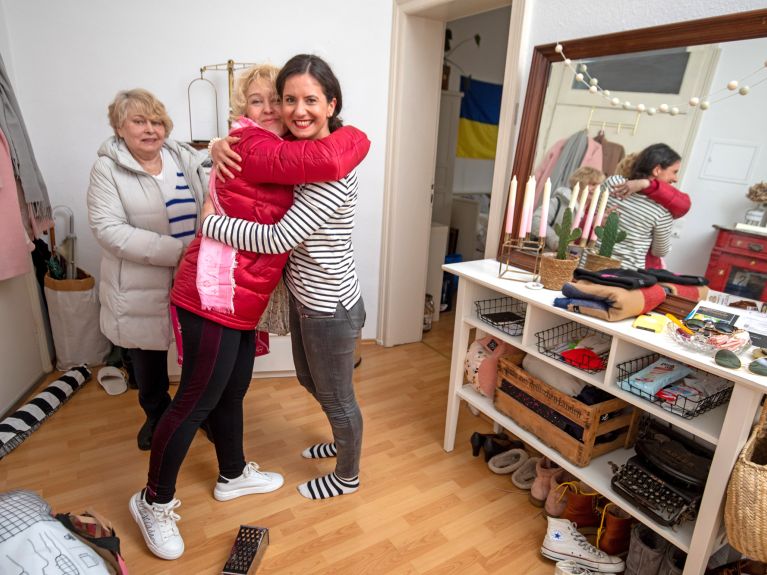
"Sabine gave us a shoulder to lean on during this difficult time", translates Daria, the ballet teacher. She followed the escape of her mother and grandmother on her mobile phone, gave tips she found on the internet, found acquaintances of acquaintances on social networks who could help with a car ride, a place to sleep for the night. She became ill from the fear and excitement, and was temporarily unable to work because of the anguish. "I simply couldn't breathe anymore", says the professional dancer and choreographer, who has danced with the National Ballet of Lithuania and choreographed for the Bolshoi Theatre in Moscow. She came to Germany a good two years ago because her boyfriend lives here.
The main thing is that we don't hear any more gunshots.
Nietmann also helps with visits to the authorities. "I was so positively surprised by helpful, courteous, really nice officials, quite different from the way they’re often presented. One even thanked her personally for showing concern for others. "As bad as the situation is, the humanity that comes through everywhere is beautiful", Nietmann says. She doesn't have to talk much all with her guests: "we often just lie in each other's arms and cry". Twice a day they watch the news together, which brings images of death and destruction into their temporary living community. "At first I asked myself whether I should even turn the TV on, but they wanted to see everything." Nietmann's flat is on a main road with lots of car noise and a screeching tram. Did her guests need earplugs and a sleeping mask, the hostess asked at the beginning. "The main thing is that we don't hear any more gunshots", was the depressing answer.
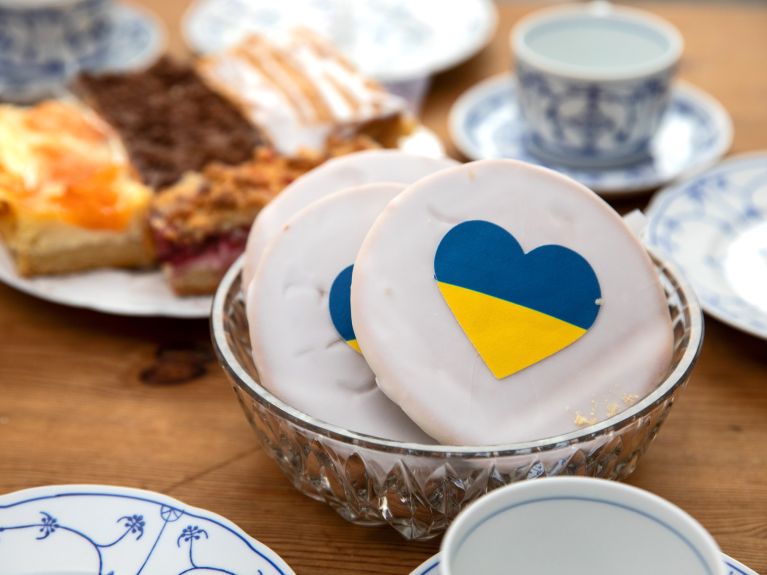
The story of the difficult escape still moves the two women: first by car along congested roads, then twelve hours waiting for a train out of Kiev, which was completely overcrowded. By car, bus, and with the help of friendly volunteers who took them through Poland a long way in a private car towards the Czech Republic, they finally reached Prague, then Dresden and from there Frankfurt. They can still hardly sleep. But they are overwhelmed by the Germans' eagerness to help.
One of Daria's dance students found an acquaintance with an empty, furnished flat, who lowered the rent so that it was affordable. Daria’s mother and grandmother can hardly believe their luck now; they are inundated with offers of crockery and cutlery, linen and clothes; they had only a change of clothes for one day and their documents with them. On the way and in Frankfurt, they had experienced only overwhelming kindness and helpfulness, and both of them repeatedly affirm how grateful they are for it. Love between people, Daria says, is what really counts in disasters like war.
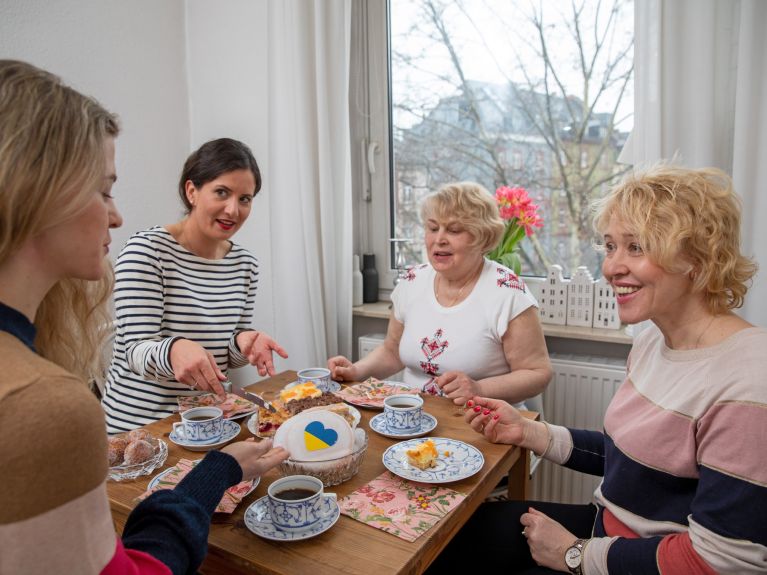
About three million people are currently fleeing in Ukraine and the number is growing every day. Around 150,000 of them had arrived in Germany by mid-March. Those who are not lucky enough to find accommodation with relatives, friends or helpful private individuals are finding refuge in school gymnasiums and halls that cities and districts have set up very quickly, equipped with cots, blankets and relief supplies from the population. Private networks overflow with offers of help. After the two women move out of the flat, Sabine Nietmann first wants to take a deep breath for a fortnight; then she wants to offer accommodation to new refugees.
You would like to receive regular information about Germany? Subscribe here:
